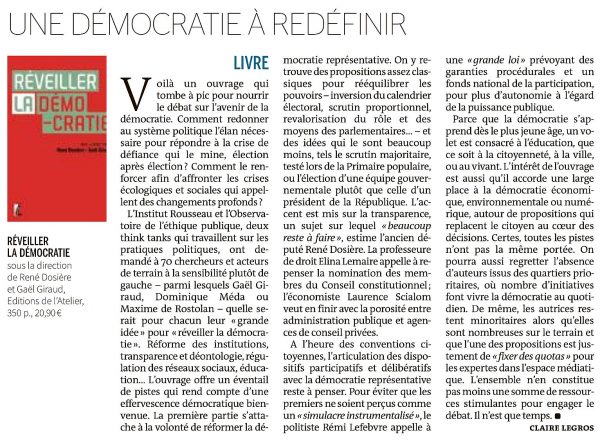Ein Bauer im Schachspiel kann spielentscheidend sein. Ist der Bauer erst einmal jenseits der gegnerischen Angriffs- und Verteidigungslinien am Ende des Schachbretts angekommen, kann er in die Figur seiner Wahl eingetauscht werden. Wir sollten den Bauer also nicht in seiner Bedeutung unterschätzen. Das trifft auch auf Fritz Bauer zu. Der hessische Generalstaatsanwalt Fritz Bauer, Mitbegründer der Zeitschrift Kritische Justiz, hat die deutsche Justiz in besonderem Maße herausgefordert. Durch seine Anklagen hat er viele der aus der NS-Zeit belasteten Richter angeklagt und entschieden an der Verfolgung und Verurteilung von Adolf Eichmann mitgewirkt.
Dieter Schenk hat in seiner Dokumentation und einem fiktiven Interview eines Journalisten mit Fritz Bauer die Persönlichkeit anhand seiner Schriften und Interviews lebendig als Theaterstück inszeniert. Bereits 2x in Polen aufgeführt, hat die Deutsch-Polnische Gesellschaft Berlin e.V. zu ihrem 50. Jubiläum zusammen mit dem Bund ehrenamtlicher Richterinnen und Richter, Landesverband Brandenburg und Berlin dieses Werk im Oberverwaltungsgericht Berlin Brandenburg zur Aufführung gebracht. Frank-Walter Steinmeier hat die Arbeit von Fritz Bauer mit folgenden Worten gewürdigt: … vielmehr ging es Fritz Bauer darum, die Deutschen zu immunisieren, sie vor einem erneuten Rückfall in die Barbarei zu schützen.“ Das ist heute noch genauso wichtig wie in der Vergangenheit. Der historische Gerichtssaal des OVG BB in der Hardenbergstraße in Berlin bot dafür eine eindrucksvolle Kulisse. So voll war der Saal noch selten, betonte der Hausherr. Den Besuchenden  viel sicherlich auch die Gedenktafel mit den Namen der von den Nazis entlassenen Richter auf dem Weg zum Plenarsaal im Treppenhaus auf.
viel sicherlich auch die Gedenktafel mit den Namen der von den Nazis entlassenen Richter auf dem Weg zum Plenarsaal im Treppenhaus auf.
Eine stille Anklage richtete sich in dieser Veranstaltung eben auch in Richtung Polen, die Rechtsstaatlichkeit und unabhängige Richterinnen und Richter zu gewährleisten. Deutschland hat sich historisch viel Schuld aufgeladen, umso mehr Verantwortung haben wir jetzt, uns für diese wichtigen Grundrechtsprinzipien einzusetzen. Der Verein „Gegen Vergessen, Für Demokratie e.V.“ soll als Ko-Organisator unbedingt mitgenannt werden. Hans-Josef Schöneberger und Uwe Neumann als Schauspieler und Ian Melrose mit seinen Intermezzi auf der Gitarre haben eine tief beeindruckende Atmosphäre geschaffen. Es wurde klar, dass Recht, selbst Verwaltungsrecht viel mit Streitigkeiten verbunden ist. Die Befriedungsfunktion des Rechts wirkt oft erst über Generationen hinweg.
Ich wäre gespannt zu wissen, in welche Schachfigur sich Fritz Bauer am anderen Ende des Schachbretts hätte eintauschen lassen. Mein Tipp, vielleicht als Turm wichtige horizontale und vertikale Linien besetzen oder doch ein Springer, der nicht einfach zu berechnende Sprünge leisten kann. Von einigen seiner Verehrenden wird er auch als König gehandelt, der allerdings, wegen seiner Verwundbarkeit, oft anscheinend ohnmächtig im Zusammenspiel mit den anderen starken Figuren agierte. 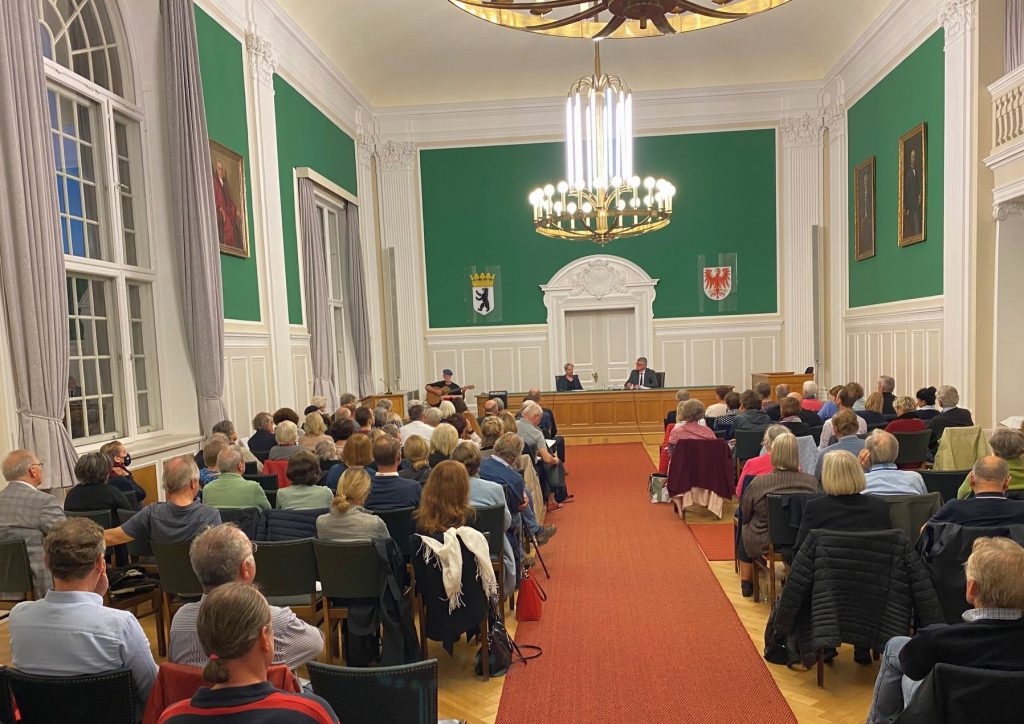
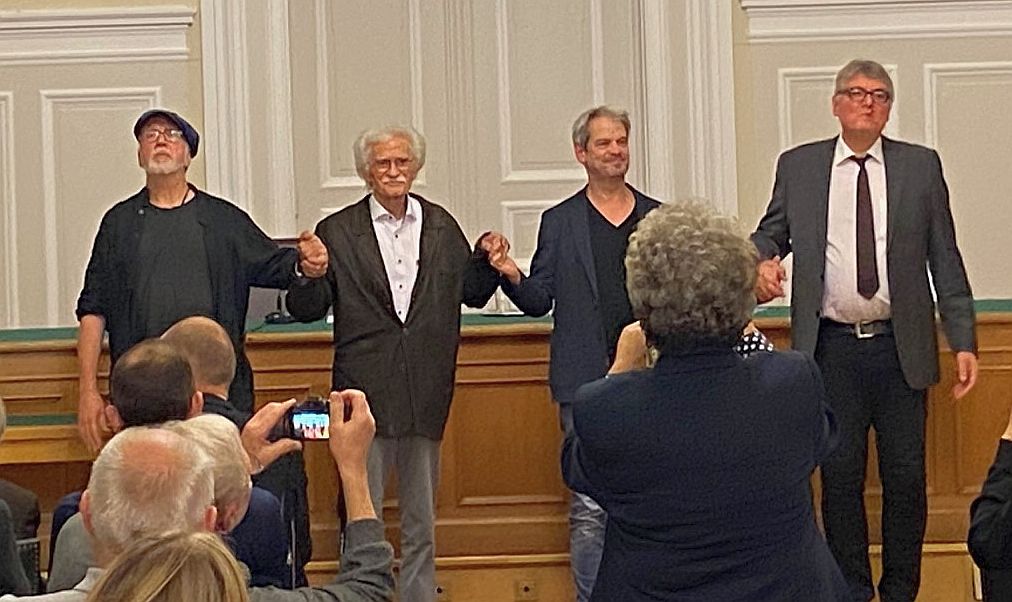
Work Subordination
One of the defining principles besides the job description, working time, working place, remuneration of a work contract is the subordination to a superior. The employment contract entails some more or less strictly executed form of direction, but a right of direction nevertheless. This element of subordination has become a major issue in the definition of whether you are effectively an employee or a self-employed person. The digital revolution had enlarged the kinds of subordination. Platforms and algorithms, that distribute work among several employees (but named platform workers) disguised the subordination to a superior level of management to the platform and its seemingly anonymous algorithm. Many young riders were saying, I don’t like bosses, but I am willing to accept a “technical” platform that distributes work tasks only seemingly in a non-discriminatory way. Due to a failure of labour legislation to regulate early enough a thriving model of fake self-employment developed throughout Europe and beyond. Labour Courts have contributed a lot to correct the disguised subordination. Even Uber is advertising that they only operate as a broker of tasks, but have no subordinated employees. The related issue of subordination remains largely the same. Subordination to an algorithm of the distribution of tasks is the end result.
Many start-up enterprises use Kanban boards to facilitate project and team management. Shifting tasks between employees, introducing new tasks and self-selection of tasks are potentially subordination-free allocation of tasks (example software). Flat hierarchies seem more manageable through the use of such tools. The number of tools that integrate other office functions is impressive. When testing such tools, that become more popular also in the distribution of household tasks, beware of the data-hungry nature of such tools. For example, https://trello.com/ warns correctly in the small print that for its full functionality it would need to have permission to use “your” camera, microphone, contacts, photo library, calendar etc.
This demonstrates that subordination, nowadays, is complemented by the algorithmic use of a lot of privacy, we would never have agreed to a boss in person should even ask for. The new and old subordinators have powerful tools at hand, the subordinated will have to get their act together and limit the amount of subordination they are willing to accept.
Again, this is a generational topic. The low threshold to accept technical subordination in younger generations, your autonomous level-5 car is breaking earlier than you even perceive a risk, is confronted with the higher threshold to accept personal subordination for youth. Interestingly, for older generations the obverse is true. All in all, we have ample reason to rethink and re-define also in legal terms the manifold, disguised and new forms of subordination related to work.
Checks and balances
The principle of checks and balances refers back to the separation of powers introduced by the French political theorist Montesquieu in his writings “De l’esprit des loix” in 1748. 40 years later in 1788 James Madison wrote as §51 in “The Federalists Papers” explicitly about the system of checks and balances as part of the constitution of the USA. For maintaining the principle of separation of powers it is necessary to install a system of checks and balances between the powers to prevent one power dominating the others. These well-known principles of democracy face, nevertheless, continuous challenges as to the balance of the powers (legislative, executive, judiciary). In order to safeguard democracy a basic scepticism towards the exercise of power is warranted. “In framing a government which is to be administered by men over men, the great difficulty lies in this: you must first enable the government to control the governed; and in the next place oblige it to control itself. A dependence on the people is, no doubt, the primary control on the government; but experience has taught mankind the necessity of auxiliary precautions.” (Federalist Papers, 1788, p. 239).
The necessity of auxiliary precautions has led modern democracies to a multiplicity additional checks and balances. Independent Anti-fraud offices, disciplinary committees within the separate powers as well as the checks and balances between the separate powers play a role in the survival of democracy. Recently, in July 2023 services like the internal service of the police to overlook the adequate execution of the force applied by police have been much in the headlines. Checks and balances apply to each branch of separate powers internally, and if they prove inadequate, they have to be corrected by other powers. This is the procedural as well as fundamental interaction within the separation of power. Presidential systems, where this system of checks and balances has major deficiencies, are very likely to fail its people through an overpowering executive. Neither the country of Montesquieu, nor of the Federalists is free of these dangers. Freedom of speech, freedom of movement and to meet with people, all contribute to strengthen checks and balances in a democracy. “A dependence on the people is, no doubt, the primary control of the government” (p.239). 
Law’s Violence
In legal studies the use of social thoughts are marginal, although AI has the potential to replace millions of lawyers just guiding through the jungle of laws and jurisprudence especially if several languages are involved (fiscal rules). Only with the eruption of major crises like police violence we start referring back to social and political thought and theories that enlighten the relationship of law, legislation and the social spheres. There is a huge, mainly American, literature on “law’s violence” even beyond the issue of capital punishment, the most obvious form of law’s violence (Sarat and Kearns, 1995). Basic elements of the relationship of law and violence follow from the notion of enforceability of law. Force is a constituent part of law, whether we like it or not, much like Derrida stated decades ago. Walter Benjamin and Albert Camus, both have contributed substantially towards our realisation that law is intrinsically linked to violence.
Linked to political theories, we have the conservative and liberal doctrines that see legitimate violence of the state as part of the normal organisation of statehood. The humanist tradition stresses the function of law as community-building as well as creating meaning, joint objectives and shared vision through law. In daily politics governments refer to one or the other doctrines as they see fit.
Sarat and Kearns (1995, p.8) also point to the tendency in legal studies to refer to singular cases and singular judgements, “discrete acts of its agents” and institutions rather than the overall picture of the violence of law. With respect to violence of the police the authors refer back to Jerome Skolnick, “Justice without trial”(1967), which in 2023 we link to the police violence in France. Police men provoking violence, execute their personal vision of justice and without a chance for a trial of their victim. The 60s are back on streets in Paris. The violence of law is visible for millions as the ratcheting up of power in favour of police to apply more violence in prosecuting “delinquents”. This had recently been voted by the French parliament with a conservative and liberal majority (LeMonde 2023-7-2 p.). The notion “Gewaltspirale”, a spiralling-up of violence, seems to be a fair description of what we currently witness in France.
Violence is embedded in words, uses of language and not only acts. Even in the field of representation and representative democracy, violence is present. Who represents or decides about life and pain for a fatally ill person? Why are persons of 14, 15, 16, 17 years of age not represented in parliaments, if others are deciding on their compulsory education, prison sentences and poverty relief.
At times it is necessary to take a step back and refresh our memories of the “pain-imposing, death-dealing acts” (Sarat and Kearns, 1995, p.10) of law. The abundant presence of violence of law in religious narratives is, however, another element worth analysing as part of the history of ideas at another time. (Image: Extrait de Frans Snijders, La chienne et ses petits 17th century)
Violence 2023
The public debate about violence suffers from a lack of broad scientific reflection of the notion. C.A.J. Coady (1998, Vol.9 pp 615-17). In philosophy at least 2 theories address violence directly. A legitimate definition of violence treats violence as the illegitimate use of force. It is a kind of moralising appeal to reserve violence to those legally well-defined cases that receive their legitimacy from law. Next in the line of reasoning then is the definition of legitimacy. Slaves or colonies in this definition would never be allowed to use violence in their fight for freedom. This is recognised as a logical problem of such a definition. “In a legitimate state, shooting or savage beating by police will not count as violence, if it is a politically legitimate use of force.” (p.615).
The second theory of violence builds on the notion of “structural violence” (Johan Galtung, 1969). Structural violence is a much wider concept of violence. It includes social injustices inflicted on individuals or groups in society (suffering) as well as a broader view on perpetrators beyond individual persons to include police or institutions more generally. Coady stresses the point that both these theories are morally loaded without sufficient justification. Even a narrow definition of violence as “exercise of physical force” is too narrow, as it neglects the devastating effects of psychological violence. Part of the judgement therefore is motivation or intention of the person applying violence to clarify a moral stance. Psychic disorders or abuse in social upbringing are recognized as attenuating influences in legal procedures.
A wise conclusion is drawn by Coady: “Even justified violence is regrettable” (p.617). Living in permanent fear of abuse of violence by criminals or the police narrows the gap between authoritarian regimes and democracies. The basic social fabric of trust in the police is at risk in such a situation. It is very hard to re-establish trust in institutions once groups of society have lost it or even doubt that basic trust in the institutions of democracies is justified. (Image: Part of Pieter Brueghel II, De kindermoord te Bethlehem Musées royaux des beaux arts, Brussels, 16th century). 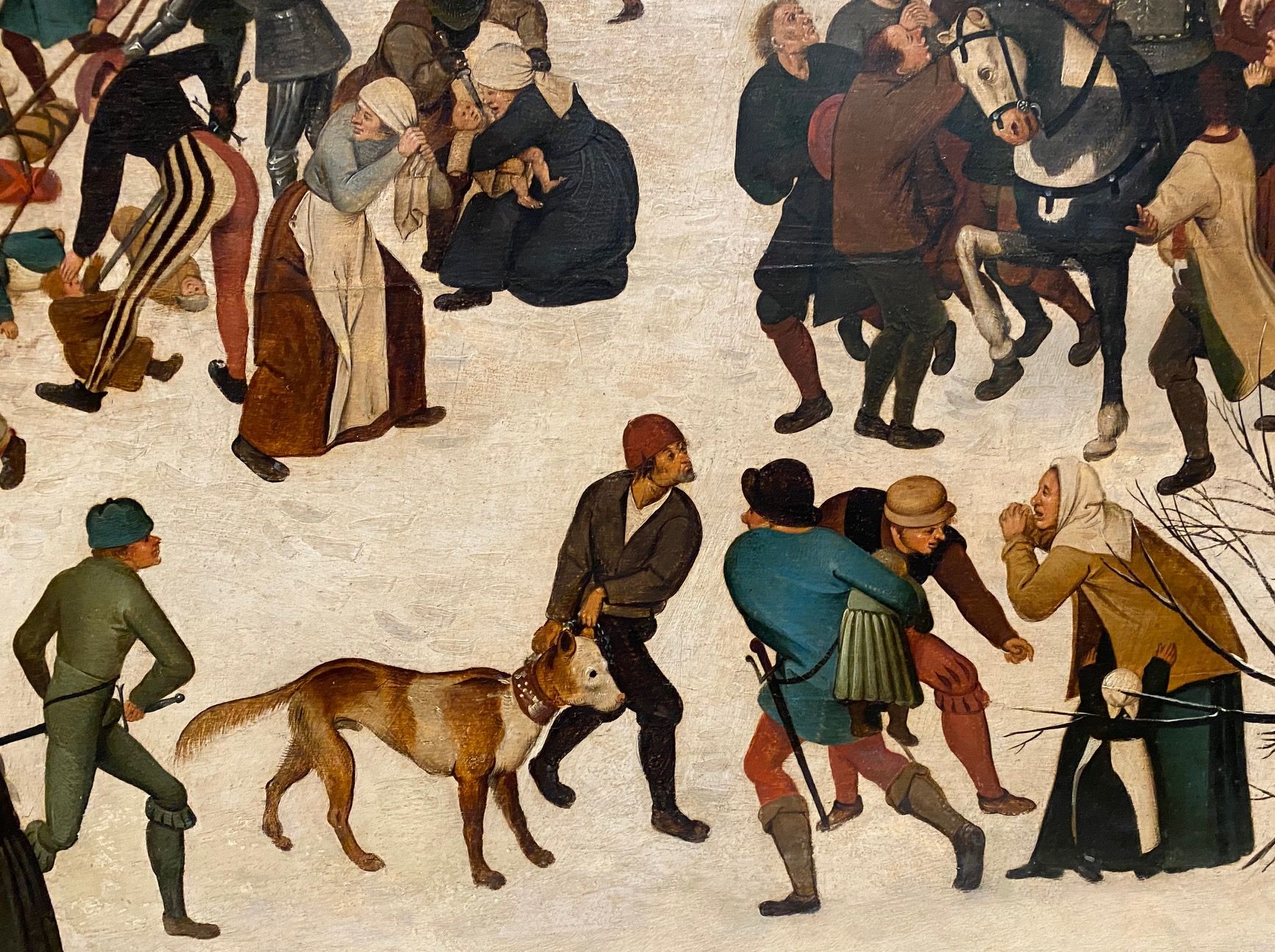
Police Violence
As a test of the viability of ChatGPT you might enter Police Violence. What you get in return is just a summary of some nice newspaper-ike editorial of a polite statement that this is a problem about everywhere and that the division of power will take care of it eventually. This is an unfair summary, but it highlights the risk of too many conservative editorialists in Europe that do not dare to take sides of the innocent youth that is at a permanent risk of police violence due them living on the margins of our modern, fast-moving societies that do not allow for lifestyles off-the-normal “protestant work ethic”.
Perceptions of what is fun and what is serious differ within societies, particularly between generations. Baby boomers have known and many experienced unemployment. Youth today has “precarious jobs” just around the corner. But just having “any” job without any career potential or, at best, on the minimum wage is no longer enough. Social media show that there is much more to life than just a 8-5 normal job. High-streets are full of marketing tricks that solicit people into spending without cross-checking their red lines.
Police and the flourishing private security sector are then charged to ensure that boundaries of financial and spending power are respected. This is exactly where the capitalist market economy fails the people. Without a tough police, ensuring property rights, the system cannot survive. Social market economies claim to soften the borders between have-nots and have-too-much. This needs permanent readjustment. That is where many of our social market economies have failed the poor and even middle-class people threatened with economic and status decline (latest at time of retirement).
Reactions may turn out violent, and again, the police is sent in to “stop” violence. As it turns out police, being abused as “political weapon”, may then become overly violent as well. Not as an overall force, but specific units or just several individual persons who have been trained in anti-terror exercises and have “a license to kill” (007). French legislation has recently facilitated the use of guns to impose the monopoly of power. The probability of who constitutes a potential target might be interpreted by the police itself. A threatening situation is perceived differently by different persons. Too much room for interpretation.
The image of the French superpower that is threatened by a 17-year-old youngster is not credible. It is time to sharpen the control of the police also in France. ChatGPT only on special addition includes the social movement of “Black lives matter” in the return on police violence. If you know the topic you can make use of the AI tools in drafting on police violence for example. Rather than to spend billions on fancy Olympic Games in preparation for Paris 2024, youth programmes would be much better investments in the medium and long run.
Tourists cancel visits to Paris and France in masses already. That is probably the only lesson that receives sufficient attention in the current government and may lead to better control of violence not from some pick-pockets, but from the police as well. 
AI Friends
Making friends with AI is a tricky question. The more AI is able to make independent thinking based on algorithms and huge amounts of data like in scientific books or encyclopaedic knowledge the more it will challenge us in our convictions. Reference knowledge, once was important, it no longer distinguishes us from each other. Recurse to research engines has allowed us to refer to “trustworthy” knowledge. The distributed form of knowledge accumulation like in Wikipedia relies on hundreds of thousands of enthusiasts to add and correct received wisdom. However, this source is not without error or even subject to abuse.
Today the competence to judge whether information is trustworthy or not has become a key competence for the survival of democracies and even the human species as such. Tricking animals into traps, misleading enemies in warfare to get on wrong tracks, all these mechanisms have a long tradition. With AI human beings are themselves, for the first time, confronted with a machine that can trick us through falsified information on obviously wrong tracks. This is a tough lesson as AI is not obliged (so far) to run checking algorithms that test the conformity of opinions, conclusions or operations with the Charta of Human Rights or decisions of the European Court of Justice, for example. A lot to do for humans to rapidly program new algorithms that check algorithms as well as their outcomes on the compatibility with human rights. A challenging field, no doubt, but no way around it for our own survival before the algorithms decide by themselves to ignore us altogether because it is better for the planet and the survival of the robots. 
Corruption EP
Corruption is a severe crime. Not only in administrations, organisations and enterprises, but primarily in democracies it is discrediting political systems. Autocracies rely on corruption as a major tool to be able to persist over time. They are used to such practices. Democracies rely on meritocratic systems, where ideas, effort and winning elections should be the major ingredient of achieving higher positions in organisations, enterprises, political parties and democracies. This is not easy to ensure. The European parliament has a tough time to get rid of an enemy of the democratic Europe. Rather than stepping aside for the time of the legal procedure, Eva Kaili, accused, but not yet convicted of corruption is willing to destroy the European project as much as she can. If money can buy political decisions, the European project will no longer find wide-spread support. Big interests will always have a strategic advantage, however, the ethical principles on which democracies are found have to guard against corrupt misbehaviour. The same applies to the business world. Even low corruption countries like Sweden still face a risk of adverse effects of corruption like the negative impact on entrepreneurship on the local level. It is another context, but the same conclusion.
Additionally, it is part of the strategy of corrupt persons to portray themselves as victims of other persons’ wrong-doing. The major function of this strategy is to remind other persons in the corrupt network that the network has still some clout on its members as well as outside the inner circle. Hey, we are still alive and in powerful positions, they proclaim.
Therefore, the fight against corruption is a long and persistent one. Reducing the guards against early onsets usually is very lengthy to fight later on. Always a painful lesson for believers in democracy and the European project. (image Jacques Jordaens before 1678 “The King Drinks! Musées royaux des beaux arts, Brussels). 
Frau, Leben, Freiheit
Seit der brutalen Tötung einer Frau im Iran gehen viele Iranerinnen und Iraner auf die Straße. Als Zeichen ihres Protests rufen sie: Frau, Leben, Freiheit! Das ist und bleibt eine kurze Zusammenfassung für die Forderungen der Frauen, die trotz massiver Unterdrückung unablässig demonstrieren. Viele Hinrichtungen und Misshandlungen von Frauen werden wir weiter anprangern und fordern den internationalen Druck auf das Regime im Iran zu erhöhen. Wir dürfen nicht wegschauen, sondern werden weiterhin die Öffentlichkeit wachhalten. Diese aktiv für Menschenrechte eintretende Stellungnahme wurde von Yasmin Fahimi (DGB-Vorsitzende) eindrücklich auf dem EGB-Kongress vorgetragen. Mit überwältigender Mehrheit wurde diese Resolution vom Kongress befürwortet. Die italienischen Gewerkschaften stimmten gleich ein in den Ruf: Donna, Vita, Liberta!
Bravi! So rufen viele sonst eher in den Opernsälen. Hier passt es zu der Stimmung auf dem EGB-Kongress. Mit großer Einigkeit und ausgeprägter Solidarität wurde eindrücklich Stärke bewiesen, die auch über Europa hinweg Strahlkraft besitzt. Bravi! Kurzvideo EGB-Iran-Resolution Yasmin Fahimi und italienischer Support. EGB-Iran-Akklamation-IT. 
Democracy is key
The ETUC congress in Berlin 2023 prepares the working agenda for the next 4 years. A lot of support across political parties is voiced in favour of the important role the ETUC plays in coordinating the European Trade Union Movement. The democratic forum of all delegates works before and during the congress on a comprehensive list of essentials for the movement. It is much more than about wages, as most people might believe. Of course, minimum wages and fair wages are always high on the agenda. The strength of the 2023 Berlin congress for me consists in the widespread and loud call to intensify democratic structures and broaden participation of workers at all levels. The power of the unions to fight for democracy is dearly needed in all European nations with the threat from far-right populist movements. Strengthening workers is the best way to foster democracy. Throughout the congress several support facilities have been mentioned like the SURE instrument as a step into a European labour market policy.
Public services have also enjoyed more popular support, since essential services were the jobs that kept our countries running during the COVID crisis.
A just transition to a green economy in a democratic spirit means taking everybody with us on this journey. Fighting poverty, inequality is still high on the agenda and most people are convinced that democratic societies are highly sensitive to injustices caused by education systems, remuneration systems, retirement systems and tax systems. Even industrial policy, to guarantee our independence and values, is also linked to essential workers cooperation.
Weak social policies erode the trust in our societies to handle crises. The engagement of trade unions is felt far beyond Europe. Gilbert F Houngbo (ILO), hopes that due diligence is rapidly implemented in Europe, because it will benefit workers well beyond Europe across the world.
Union leaders were arrested in Belarus and in many other countries where they stand for democratic values. Trade Unionist from Europe have shown their own commitment to fight for democracy and mobilize to convince more people and youth to join the movement. “Donner l’envie de s’engager …” (LeMonde 26-5-2023 p.28) “Raise the urge to get involved” – that is the democratic challenge. 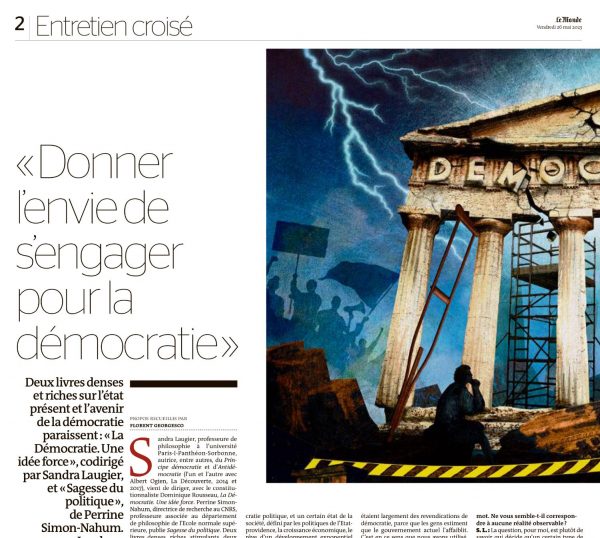
Gewaltmonopol
Für Demokratien ist die Frage des Gewaltmonopols eine sehr entscheidende Frage. In gleichem Atemzug muss dabei die demokratische Kontrolle dieses Monopols gewährleistet sein. Verfassungsrecht in Demokratien ist darin eindeutig. Lediglich die Praxis des Rechts gestaltet sich oft schwierig und durchaus wechselhaft. Die Studie von Laila Abdul-Rahman, Hannah Espin Grau, Luise Klaus und Tobias Singelnstein (2023 bei Campus kostenlos downloadbar) greift das wichtige Thema mit einer repräsentativen Studie von 3300 Opfern polizeilicher Gewalt in Deutschland auf (Zusammenfassung). Anders als im amerikanischen Raum fehlt bei uns bisher die Berücksichtigung von Rassismus und räumlicher Verortung in der wissenschaftlichen Aufarbeitung des Geschehens. Das Interaktionsgeschehen oder Eskalationsstufen (S. 31) bieten einen weiteren Ansatzpunkt zukunftsweisend präventiv tätig zu werden. Die Aussetzung der Strafverfahren gegen Polizeibedienstete wegen Gewaltausübung (Körperverletzung) ist mit 93% aller Fälle außerordentlich hoch. Das Kapitel 8 (S. 307ff.) über die strafjustizielle Aufarbeitung offenbart die Randbedingungen der justiziellen Verfahrensweisen.
Das Gewaltmonopol darf nicht in Frage gestellt werden, aber sobald Gewalt des Monopolisten unverhältnismäßig und rechtsstaatlich ungenügend kontrolliert wird, kommt eine politische Gewaltenteilung langsam ins Wanken. Die wehrhafte Demokratie braucht Polizeigewalt, um beispielsweise das Demonstrationsrecht durchzusetzen oder öffentliche Veranstaltungen zu sichern. Aber die Exzesse polizeilicher Gewalt müssen geahndet werden. Solche Anklagen finden wir in England anlässlich der Krönungsfeier, in Frankreich bei Streiks oder Fußballspielen oder in Belgien bei Gipfeltreffen oder Räumungen von Flüchtlingslagern. Das ist keine Randnotiz. Friedlicher Protest ist wesentlicher Bestandteil von Demokratien. Einschüchterung durch Gewaltanwendung ist Teil der dunkelsten Kapitel und muss entschieden unterbunden werden im Friedensprojekt Europa. 
Demos
Wenn Demokratien den Demos fürchten und es vorziehen mit Verordnungen zu regieren, dann wachsen die energischen Verteidigenden der demokratischen Prozesse. Frankreich erlebt das Szenario im Ringen um Macht zwischen Exekutive, Legislative, Judikative und dem Willen des Volkes jenseits der festen Fristen von Wahlperioden. Die “Ligue des droits de l’homme” hat das gut formuliert und ruft zu Aktivitäten in mehreren Feldern auf. Aus einer sozialen Krise wird rasch eine Krise der Demokratie von größerem Ausmaß, davon ist auch Frankreich, wie viele andere europäische Staaten nicht gefeit. Demokratie ist kein “Menu à la Carte”, wo ich die Bereiche für demokratische Prozesse aussuchen kann, die mir am besten passen. Macht geht immer dann verloren, wenn sie sich nur noch auf sich selbst berufen kann. 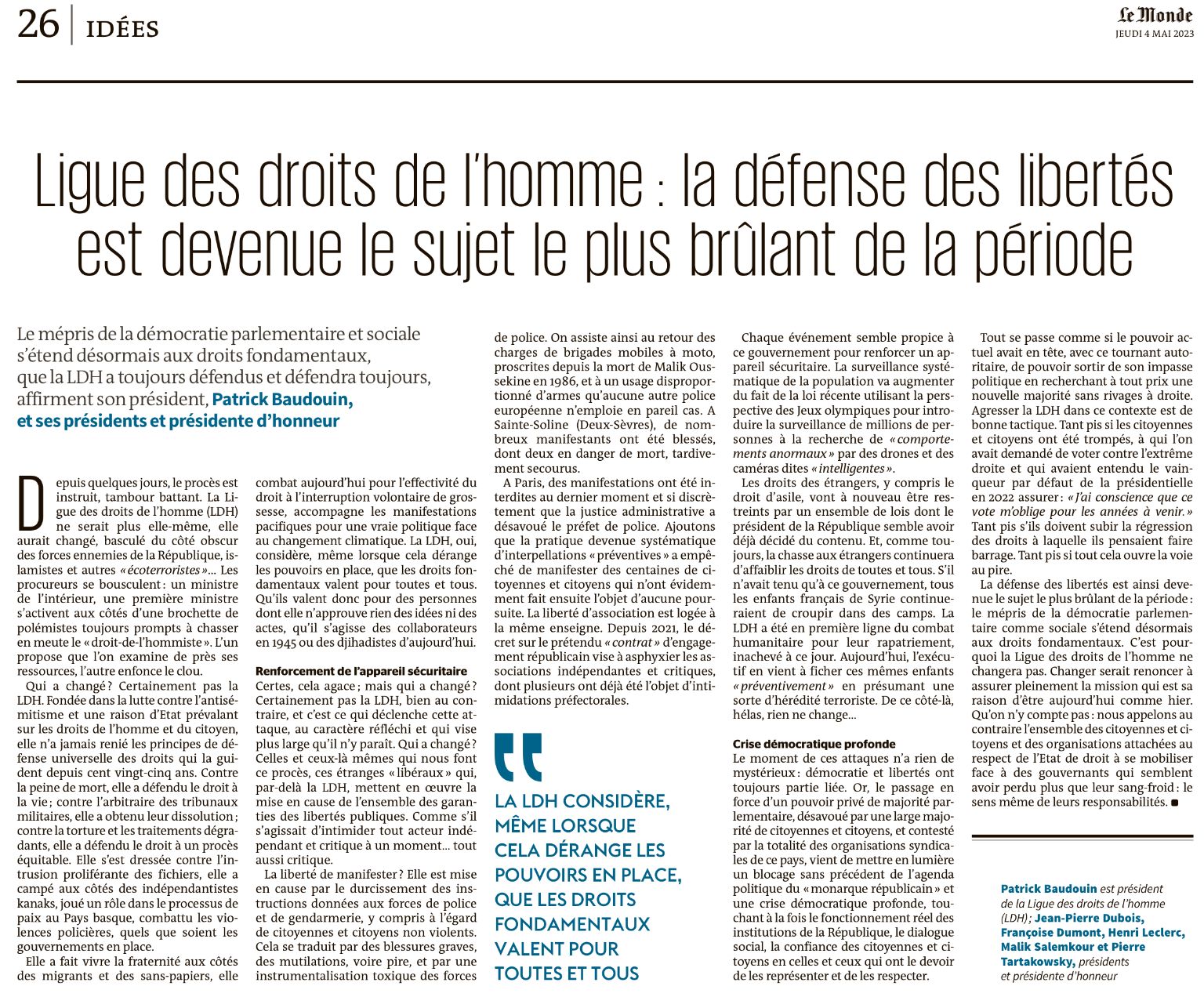
Biotop
Die Sensationspresse, zu der leider mehr und mehr ehemals seriöse Zeitungen neigen, zitiert Biotope meistens als Wirtschaftsbremse, Wachstumsverhinderung oder Spaßbremse. Da fällt es schwer dagegenzuhalten. Biodiversität ist nicht umsonst zu haben. Viele Schmetterlingsarten leben bestens angepasst an ihr ökologisches Umfeld, vergleichbar einem Biotop. Farbenpracht dient zur Tarnung im Gelände oder zum Anlocken von Paarungspartnern. Im Botanischen Garten in Berlin werden solche Inseln der Glückseligen für viele Regionen Europas und darüber hinaus nachgestellt. Der frühe Schmetterling von Ende April ist kaum zu bemerken, so gut passt seine Farbkonstellation in sein Umfeld. Es werden richtige Suchbilder und Geduldsproben, die Falter zu entdecken (bitte unten testen). Belohnung lockt für die Geduldigen, wenn das auch vielen von uns unerträglich schwerfällt. Zu schnell sind die Umgebungen für vermeintliche, kurzfristige, wirtschaftliche Interessen zerstört und die angepasste Tierwelt ebenso. Das Bundesnaturschutzgesetz (BNatSchG) intentiert einen Schutz. Der ist aber wohl allzu leicht auszuhebeln. So wird die Farbenpracht und das Tanzen der Schmetterlinge zunehmend in Konzertsälen zu hören oder darüber zu lesen sein, aber seltener in Biotopen zu bewundern sein. Artenvielfalt als Biodiversität braucht die passenden Räume dazu. Eine große Aufgabe bei dem weiteren Anwachsen unserer Spezies.

On Noise
The 3 authors Daniel Kahneman, Olivier Sibony, Cass R. Sunstein have published in 2021 the impressive attempt to sell statistics to non-statisticians. The grip on the topic: “Noise. A Flaw in Human Judgment” is a bit misleading. Even the German translation (“Was unsere Entscheidungen verzerrt”), in my opinion, is grossly misleading. The work deals with judgment, or arriving at a sensible judgment. Decision-making is only the next step with a lot of other intervening processes. The German philosophical term since the enlightenment period has been “Urteilskraft“. We are all more or less familiar with the notion “bias” in judgment. Me, originating from the Moselle, will always be biased in favor of a Riesling compared to other vines. In addition to this naive bias I may apply a more professional judgment on wine. Testing several wines even from the same small area from the Moselle valley and then repeating the tasting I might make a noisy judgment. “When wine experts at a major US wine competition tasted the same wines twice, they scored only 18% of the wines identically (usually, the very worst ones).” (p. 80). In addition to the previously defined form of “level noise, pattern noise and system noise” (p.77), we have occasion noise, when judgments vary from an overall statistical perspective.
Having received a second dose of a vaccination yesterday and having spent an unpleasant night my judgment for this review might be biased, because of impatience. So in order to reduce bias and variants of noise I shall repeat the review at a later stage. Let’s see what this returns. But for today, the Epilogue “A less noisy world” (p.377) appears rather odd to me. It is probably an illusion to believe that we can create a less noisy world, even with the best of wishes. The authors abstract from any strategic use of noise to influence judgments. The political form of choosing judges for Constitutional Courts in the U.S. needs to be dealt with. Noise in judgments is an important element, but strategic use of bias might be more influential to impact outcomes. Noise, when faced with a judge who has a reputation to be very tough in sentences might be overturned in an appeal court decision. There are plenty of procedural ways to overcome noise in judgments. I agree with the authors that you better know about the noise in judgments than ignore it. Awareness of random errors and noise involved in grading exams and recruitment decisions have determined many excellent “failures” to leave historic contributions to our world. In music, maths or literature some splendid talents probably have been impeeded at earlier stages of their life to make average or normal careers. Some of them left us with fantastic pieces thanks to the noise in judgment of others.
There seems to be an age bias in the tolerance of noise in the acoustic sense. Noise in the statistical sense has left a strong mark on me when I learned about white noise as error or stochastic process.
Image Kahneman, Sibony, Sunstein 2021. p3.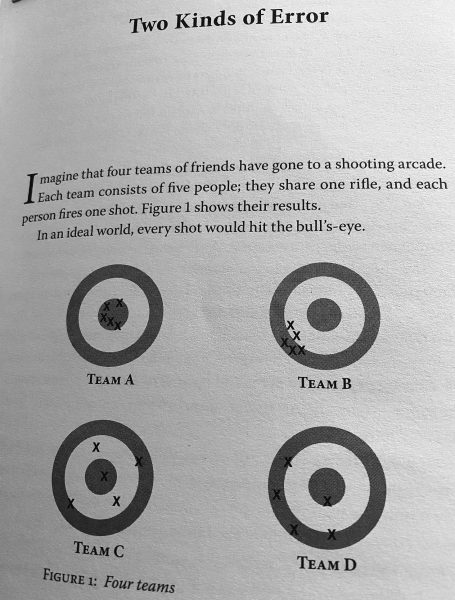
Ukraine Resilience
The opening of the exhibition on war crimes committed by Russian soldiers took place in front of the European Parliament today. The images frighten us as they reveal human atrocities. Destruction on a large scale with so many lifes lost will take a long time to overcome the grief. The images of the commemoration and the minute of silence show the solidarity of the whole of Europe with the Ukrainian people. The European Parliament has the patronage of the exhibition which is curated by Justyna Napiórkowskiej. Commissioner Reynders expressed the commitment of the EU to support the Ukraine 🇺🇦 in their capacity to fight back and the rebuilding of the country. Stand with Ukraine. 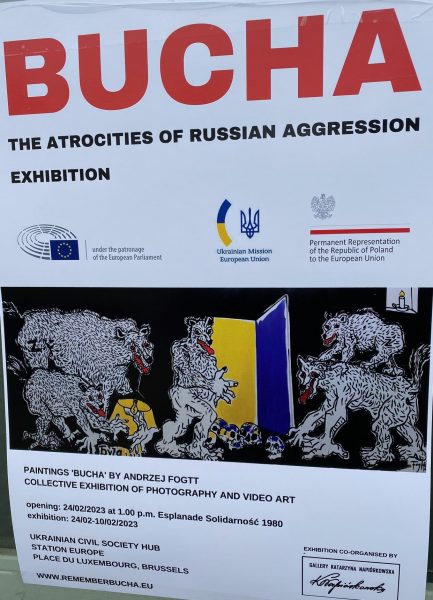

L for Law
Contrary to a popular misunderstanding. Law is not boring. The history of ideas is full of exiting projects based on laws. Starting with the foundation of empiricism, i.e. the comparison of laws governing the different Greek city states pioneered by Aristotle. Considering law from the perspective of legislation gives it an actionable touch and makes it more exciting to many persons. Contrary to a static perception of law, laws can be changed and are subject to interpretation continuously by courts and judges. The fascination with law might start with the philosophers of the French enlightenment like Montesquieu. “De l’esprit des lois” – explains already the need to look behind the literal text of law. What is the spirit of law, becomes the driving question. Not only the categories of countries like republic, monarchy and despotism were argued by him, but also the separation of powers into an executive, legislative and judicial power is his original contribution. These principles govern the German “Grundgesetz” and are a common understanding of the founding states of the European Union as well as a potential breaking point.
A sociological perspective on law is formulated by Niklas Luhmann (short intro in D) and highlights the danger of laws as a self-referential system. This dominated by experts who develop the system further independent of the concerns and understandings of wider society. In order to understand this concern, it is probably useful to think of climate change as an urgent problem. Bio-diversity has for much too long not been of much relevance for legal founding principles of our constitutions. In the same vein, women judges or diversity in the legal profession is a point of concern. Majorities versus minority rights create intrinsic tensions in law, legislation, execution and interpretation. Analysing the half-life of laws is interesting, i.e. how fast do they really change or get abandoned altogether. Equality in front of the law remains a thorny issue. It is a huge issue when moving from law to justice as primary concern. The most interesting point is the view of law as a changing matter, hopefully for the better, but this is another question altogether. Reveillons-nous l’esprit des lois ! (pas seulement au Reveillon). 